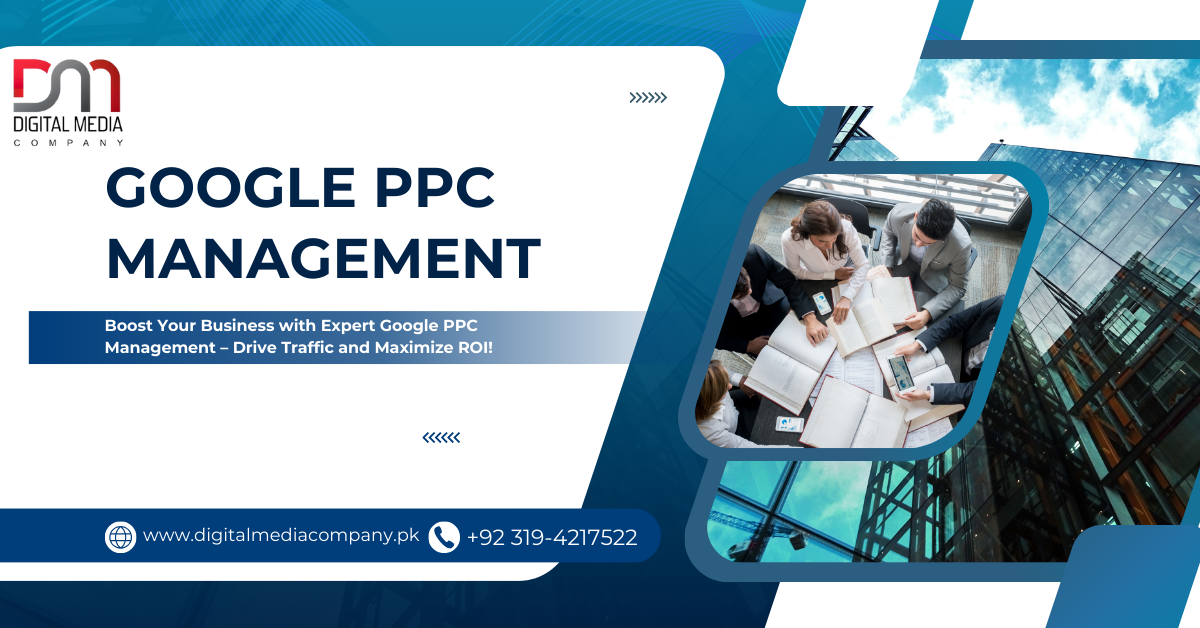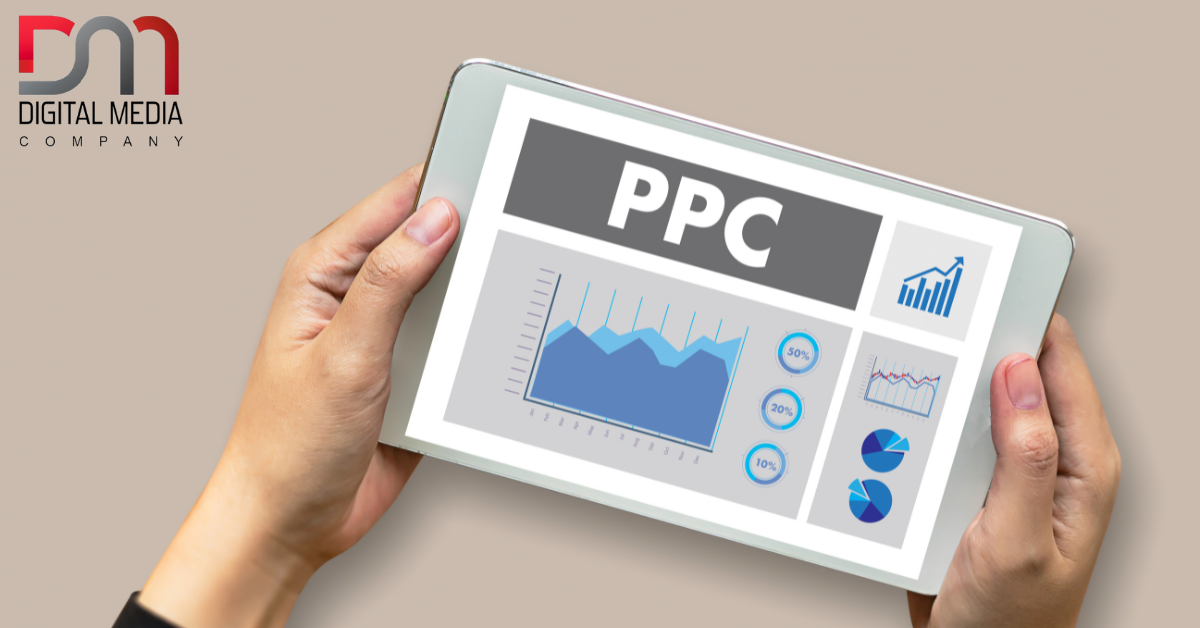DMC Provides Exceptional Google PPC Management Service
 |
| Google PPC Management |
What is Google PPC Management?
Google PPC management refers to the process of overseeing and managing a company’s PPC advertising campaigns on Google. It involves creating and optimizing ads, selecting relevant keywords, setting budgets, and monitoring the performance of these ads to ensure maximum return on investment (ROI). PPC management is crucial for businesses looking to make the most of their advertising budgets and achieve their marketing objectives efficiently.
Effective Google PPC management requires a deep understanding of the platform’s algorithms and features. It involves continuous analysis and adjustment of campaigns to ensure they are performing optimally. This includes testing different ad formats, adjusting bids, and refining targeting to reach the most relevant audience. By doing so, businesses can achieve higher click-through rates (CTR), lower costs per click (CPC), and ultimately, better conversion rates.
Benefits of Google PPC Management
The primary benefit of Google PPC management is its ability to drive immediate traffic to your website. Unlike organic search engine optimization (SEO), which can take months to show results, PPC ads can generate clicks and conversions as soon as they are activated. This makes PPC an ideal strategy for businesses looking to achieve quick wins and immediate visibility in the search engine results pages (SERPs).
Another significant advantage is the high level of control and flexibility it offers. With PPC management, businesses can set their own budgets, choose specific keywords to target, and create tailored ad copy to appeal to their audience. Additionally, PPC campaigns provide valuable data and insights, allowing marketers to track performance, measure ROI, and make data-driven decisions to optimize their campaigns continually. This level of control and transparency makes Google PPC management an invaluable tool for any digital marketing strategy.
How Google PPC Management Works
Google PPC management operates on a bidding system where advertisers compete for ad placement in the SERPs. When a user searches for a keyword related to the advertiser’s business, an auction is triggered, and Google selects the most relevant ads to display. The position of these ads is determined by the bid amount and the ad’s quality score, which is based on factors like relevance and landing page experience.
Once the ad is clicked, the advertiser pays a fee to Google. This fee is referred to as the cost per click (CPC), and it varies depending on the competitiveness of the keyword and the ad’s quality score. The goal of PPC management is to achieve the highest possible ad position at the lowest possible cost. This requires continuous monitoring and optimization of campaigns to ensure they are performing effectively and efficiently.
Effective Google PPC management also involves setting up and tracking conversion goals. This could be anything from a user making a purchase, filling out a contact form, or signing up for a newsletter. By tracking these conversions, businesses can measure the success of their PPC campaigns and make informed decisions about future strategies. This data-driven approach ensures that businesses can maximize their ROI and achieve their marketing goals.

Key Components of a Successful PPC Campaign
Keyword Research
Researching keywords is the cornerstone of any effective PPC campaign. It involves identifying the most relevant and profitable keywords that potential customers are using to search for products or services. This process requires a deep understanding of the target audience, their search behavior, and the competitive landscape. By selecting the right keywords, businesses can ensure that their ads are shown to the most relevant audience, increasing the chances of clicks and conversions.
There are various tools and techniques available for conducting keyword research. Google Keyword Planner, for example, is a popular tool that provides insights into search volume, competition, and suggested bid prices for different keywords. Additionally, businesses can use competitor analysis to identify keywords that are driving traffic to their competitors’ websites. By combining these insights, businesses can develop a comprehensive list of keywords that will form the basis of their PPC campaigns.
Ad Creation
Creating compelling and effective ads is a critical component of PPC management. Ads need to be relevant, engaging, and persuasive to attract clicks and drive conversions. This involves crafting compelling ad copy that highlights the unique selling points of the product or service and includes a strong call to action (CTA). The ad copy should be tailored to the target audience and aligned with the keywords being targeted.
In addition to ad copy, businesses also need to consider the visual elements of their ads. This includes choosing the right images, videos, and other multimedia elements that will capture the audience’s attention. It’s also important to test different ad formats and variations to determine which ones perform the best. By continuously optimizing ad creatives, businesses can improve their click-through rates (CTR) and overall campaign performance.
Bidding Strategies
PPC advertisements depend heavily on successful bidding tactics. There are various bidding options available, including manual bidding, automated bidding, and enhanced CPC (Cost Per Click). Each strategy has its own advantages and disadvantages, and the choice of strategy will depend on the campaign goals, budget, and level of control desired by the advertiser.
Manual bidding allows advertisers to set their own bid amounts for each keyword, giving them complete control over their ad spend. Automated bidding, on the other hand, uses Google’s algorithms to adjust bids based on the likelihood of achieving the desired outcome, such as clicks or conversions. Enhanced CPC combines both approaches, allowing advertisers to set their own bids while Google adjusts them based on the likelihood of conversion. By choosing the right bidding strategy, businesses can maximize their ROI and achieve their campaign objectives.
Landing Page Optimization
Landing page optimization is a critical aspect of PPC management. The landing page is the first point of contact for users who click on an ad, and it plays a significant role in determining whether they convert or bounce. A well-optimized landing page should be relevant to the ad, provide a clear value proposition, and include a strong call to action (CTA). It should also be user-friendly, with a clean design and easy navigation.
Effective landing page optimization involves continuous testing and refinement. This includes A/B testing different elements of the landing page, such as headlines, images, and CTAs, to determine which variations perform the best. By continuously optimizing landing pages, businesses can improve their conversion rates and overall campaign performance. This ensures that they get the most value from their PPC spend and achieve their marketing goals.

Google PPC Management Tools and Software
There are various tools and software available to help businesses manage their Google PPC campaigns effectively. These tools provide valuable insights, automate routine tasks, and help optimize campaigns for better performance. Some of the most popular PPC management tools include Google Ads, SEMrush, Ahrefs, and Moz. These tools offer a range of features, from keyword research and competitor analysis to bid management and performance tracking.
Google Ads is the primary platform for managing PPC campaigns on Google. It provides a comprehensive set of tools for creating, managing, and optimizing ads. This covers ad production, bid management, performance tracking, and keyword research. Google Ads also offers automated bidding and ad optimization features, which use machine learning algorithms to improve campaign performance.
SEMrush, Ahrefs, and Moz are popular tools for keyword research and competitor analysis. They provide valuable insights into search volume, competition, and keyword trends, helping businesses identify the most profitable keywords for their campaigns. These tools also offer features for tracking keyword rankings, analyzing backlinks, and monitoring competitors’ PPC campaigns. By using these tools, businesses can gain a competitive edge and improve their PPC campaign performance.
Tracking and Analyzing PPC Performance
Tracking and analyzing PPC performance is crucial for optimizing campaigns and achieving marketing goals. This involves monitoring key performance indicators (KPIs) such as click-through rates (CTR), cost per click (CPC), conversion rates, and return on investment (ROI). Businesses can optimize their campaigns by identifying areas for improvement and making data-driven decisions by examining these indicators.
Google Ads provides a range of tools for tracking and analyzing PPC performance. This includes detailed reports and dashboards that provide insights into campaign performance, keyword performance, and ad performance. Google Ads also offers conversion tracking, which allows businesses to track specific actions that users take after clicking on an ad, such as making a purchase or filling out a contact form. This data is invaluable for measuring the success of PPC campaigns and making informed decisions about future strategies.
In addition to Google Ads, businesses can use third-party analytics tools like Google Analytics to track and analyze PPC performance. These tools provide additional insights into user behavior, traffic sources, and conversion paths. By combining data from multiple sources, businesses can gain a comprehensive understanding of their PPC performance and make informed decisions to optimize their campaigns.
Common Challenges in Google PPC Management
While Google PPC management offers numerous benefits, it also comes with its own set of challenges. One of the most common challenges is managing ad spend and ensuring a positive ROI. PPC campaigns can be expensive, and without careful management, costs can quickly spiral out of control. This requires continuous monitoring and optimization of campaigns to ensure they are performing efficiently and delivering value.
Another common challenge is staying ahead of the competition. The digital advertising landscape is highly competitive, with businesses constantly vying for the top ad positions. This requires continuous research and analysis to identify new opportunities and stay ahead of competitors. It also involves testing and refining ad creatives, targeting strategies, and bidding strategies to ensure the best possible performance.
Ad fatigue is another challenge that businesses often face with PPC management. Over time, users may become desensitized to ads, resulting in declining click-through rates (CTR) and conversion rates. To combat ad fatigue, businesses need to continuously refresh their ad creatives and test different variations to keep their audience engaged. This requires a proactive approach to campaign management and a commitment to continuous optimization.

Best Practices for Google PPC Management
To achieve the best results from Google PPC management, businesses should follow a set of best practices. One of the most important best practices is continuous testing and optimization. This involves regularly testing different ad creatives, keywords, bidding strategies, and landing pages to identify the best-performing variations. By continuously optimizing campaigns, businesses can improve their performance and achieve their marketing goals.
Another best practice is to use data-driven decision-making. This involves using data and analytics to inform campaign strategies and make informed decisions. By analyzing key performance indicators (KPIs) such as click-through rates (CTR), cost per click (CPC), and conversion rates, businesses can identify areas for improvement and make data-driven decisions to optimize their campaigns. This ensures that campaigns are performing efficiently and delivering value.
It’s also important to stay up-to-date with the latest trends and best practices in PPC management. The digital advertising landscape is constantly evolving, with new features, tools, and strategies emerging all the time. By staying informed about the latest trends and best practices, businesses can stay ahead of the competition and ensure their campaigns are performing at their best. This requires a commitment to continuous learning and a proactive approach to campaign management.
Case Studies of Successful PPC Campaigns
Case studies of successful PPC campaigns provide valuable insights into what works and what doesn’t in PPC management. These case studies highlight real-world examples of businesses that have achieved exceptional results with their PPC campaigns, providing valuable lessons and inspiration for other businesses. By analyzing these case studies, businesses can identify best practices and strategies that they can apply to their own campaigns.
One example of a successful PPC campaign is the case of a leading e-commerce retailer that used Google PPC to drive sales and increase brand awareness. By conducting thorough keyword research, creating compelling ad creatives, and optimizing landing pages, the retailer was able to achieve a significant increase in click-through rates (CTR) and conversions. The campaign also provided valuable data and insights that helped the retailer refine their marketing strategies and achieve their business goals.
Another example is the case of a B2B software company that used Google PPC to generate leads and drive sales. By targeting relevant keywords, creating tailored ad copy, and using automated bidding strategies, the company was able to achieve a significant increase in lead generation and sales. The campaign also provided valuable insights into the target audience’s behavior and preferences, helping the company refine their marketing strategies and achieve their business goals.
Why Choose Digital Media Company (DMC) for Google PPC Management
Choosing the right partner for Google PPC management is crucial for achieving the best results. Digital Media Company (DMC) is a leading provider of PPC management services, with a proven track record of success. By partnering with DMC, businesses can benefit from expert knowledge, advanced tools and technologies, and a commitment to delivering exceptional results.
DMC offers a comprehensive range of PPC management services, including keyword research, ad creation, bid management, and performance tracking. Our team of experienced professionals uses data-driven strategies and advanced tools to optimize campaigns and achieve the best possible results. We also provide continuous support and guidance, helping businesses navigate the complexities of PPC management and achieve their marketing goals.
One of the key advantages of partnering with DMC is our commitment to transparency and accountability. We provide detailed reports and dashboards that provide insights into campaign performance, allowing businesses to track their ROI and make informed decisions. We also offer regular updates and consultations, ensuring that businesses are always informed about the progress of their campaigns and any changes that may be needed.

FAQs
What is PPC?
Advertisers using the Pay-Per-Click (PPC) digital advertising strategy are charged a fee each time their ad is clicked. It’s a method of purchasing website visits as opposed to trying to obtain them naturally.
How does Google PPC work?
Google PPC works on a bidding system where advertisers compete for ad placement in the search engine results pages (SERPs). When a user searches for a keyword related to the advertiser’s business, an auction is triggered, and Google selects the most relevant ads to display.
Why is PPC important for businesses?
PPC is important for businesses because it allows them to achieve immediate visibility in the search engine results pages (SERPs) and drive targeted traffic to their website. Increased revenue, leads, and brand exposure may result from this.
How can I optimize my PPC campaigns?
You can optimize your PPC campaigns by conducting thorough keyword research, creating compelling ad creatives, using effective bidding strategies, and continuously testing and refining your campaigns. It’s also important to track and analyze performance metrics to identify areas for improvement.
How much does PPC cost?
The cost of PPC can vary depending on factors such as the competitiveness of the keywords being targeted, the bidding strategy used, and the overall budget of the campaign. It’s important to set a budget and continuously monitor and optimize campaigns to ensure they are performing efficiently and delivering value.
Conclusion
Google PPC management is a powerful tool for businesses looking to enhance their online presence and achieve their marketing goals. By leveraging this tool, businesses can drive targeted traffic to their website, increase conversions, and achieve a positive ROI. However, effective PPC management requires a deep understanding of the platform, continuous monitoring and optimization, and a proactive approach to campaign management.
Partnering with a professional company Digital Media Company can help businesses navigate the complexities of PPC management and achieve the best possible results. With a commitment to transparency, accountability, and delivering exceptional results, Digital Media Company (DMC) is the ideal partner for any business looking to succeed with Google PPC management. Contact DMC today to grow your business and online presence through superior Google PPC management.
Comments
Post a Comment